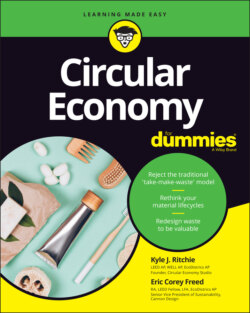Читать книгу Circular Economy For Dummies - Eric Corey Freed - Страница 99
Responding to disruption
ОглавлениеConsidering the proposed methods of a circular economy business model, it’s difficult to comprehend the reasons behind their delayed implementation on a global scale. It really does seem like common sense. Developing more durable products that last longer, increasing the repairability and customization potential of products, developing smarter material lifecycles and collection methods, recycling waste, and creating community sharing platforms are all methods that prepare businesses to respond to disruptions. On top of all this, implementing circular economy practices saves customers money, reduces waste, keep products in use longer, and allows the natural world to regenerate itself.
A whole range of companies is already implementing circular economy principles within their business processes — like Airbnb, General Motors, and Patagonia — which proves that the future of the global economy is circular. This is bad news for the business-as-usual approach to systems design. This linear approach will seem like anything but usual in the coming years. It makes sense that these industrial giants are adopting the essential principles of the circular economy now rather than later as the best approach to minimizing disruption down the road (even if, for some, it’s a somewhat bitter pill to swallow). Most of these industrial giants have had their moment of realization and acknowledge the opportunity behind turning waste into wealth.
